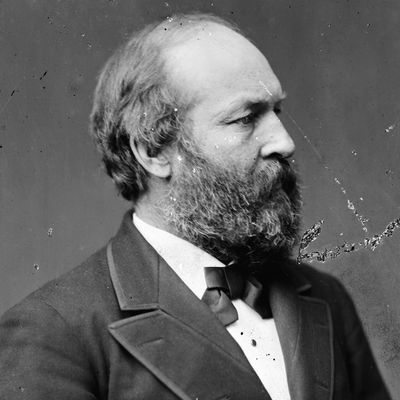
With all the talk about a potentially giant 2020 Democratic presidential field, it’s difficult to focus on any one subcategory of candidate that’s oversubscribed. But one that really jumps out at you is this one noted by Roll Call:
As high-profile Democratic senators and governors steel themselves for a race to challenge President Donald Trump in 2020, at least six sitting House Democrats are rumored to be weighing runs.
They include Reps. Adam B. Schiff and Eric Swalwell of California, Tulsi Gabbard of Hawaii, Seth Moulton of Massachusetts, Tim Ryan of Ohio and Beto O’Rourke of Texas.
Another, Maryland Rep. John Delaney, announced his presidential campaign way back in July 2017.
It’s unclear how many of these people would still be in the House as presidential candidates if they ran; the most luminous of them at present, Beto O’Rourke, is already on his way out of office in January.
For the record, though, the only sitting House member ever to be elected president was James Garfield, whose election victory (before a brief presidency ended by assassination) will have been 140 years old in 2020. Garfield also had a bit of pre-congressional distinction as a college president, preacher, and decorated Civil War general.
Two other presidents were former House members who never occupied a higher elected office before occupying the White House: Founding Father James Madison and the great liberator of slaves and savior of the Union Abraham Lincoln. Presumably folks like Eric Swalwell and John Delaney don’t put themselves in that kind of company just yet.
Gerald Ford is hard to classify: He was a career House member (and Minority Leader) when Richard Nixon chose him to succeed the disgraced Spiro Agnew as vice-president, and then of course he ascended to the presidency when Nixon resigned due to his own, separate scandal. Ford subsequently won the 1976 GOP presidential nomination, but was never actually elected president.
No sitting House member has won a major-party presidential nomination since Garfield’s election, though two former members who had won no higher office, William Jennings Bryan (1896, 1900, and 1908) and James W. Davis (1924) won the Democratic nod. Two 20th-century Democratic House Speakers ran credible presidential campaigns that fell short of the nomination: Champ Clark in 1912 and John Nance Garner in 1932.
House members have with some frequency crashed and burned as presidential candidates. Longtime congressman Ron Paul ran for president as a Libertarian in 1988 and as a Republican in 2008 and 2012. House right-wing outlier Michele Bachman was the GOP presidential front-runner in 2012 for about five minutes. Jack Kemp, later a Cabinet secretary and vice-presidential nominee, was a House member when he underwhelmed everyone as a 1988 presidential aspirant. A House member did have an impact on the 1980 presidential general election, when former GOP candidate John Anderson ran as an independent, and at one point, was scoring in the 20s in general-election polls. And perhaps the quintessential modern House candidate for president was Mo Udall of Arizona in 1976, who ruefully called himself “Second Place Mo” after repeated finishing just behind Jimmy Carter in the Democratic primaries that year.
Now perhaps today’s bumper crop of potential 2020 candidates from the House is full of pols secretly hoping to do well enough to take the second spot on the ticket. There have been a goodly number of House members chosen as vice-presidential nominees, most recently House Speaker Paul Ryan in 2012. Though nobody much remembers this, the most powerful vice-president (arguably) in U.S. history, Dick Cheney, was a former House member never elected to a higher office before coming to power with George W. Bush. The sky is theoretically the limit. But even at a time when Donald Trump has supposedly destroyed all the precedents about qualifications for office, there’s still something about House members running for president that suggests premature, self-regarding grandiloquence. It’s unclear what a junior House member has that your average billionaire or television celebrity doesn’t have. But it’s the sort of comparison we may be making often between now and the Iowa caucuses.






























